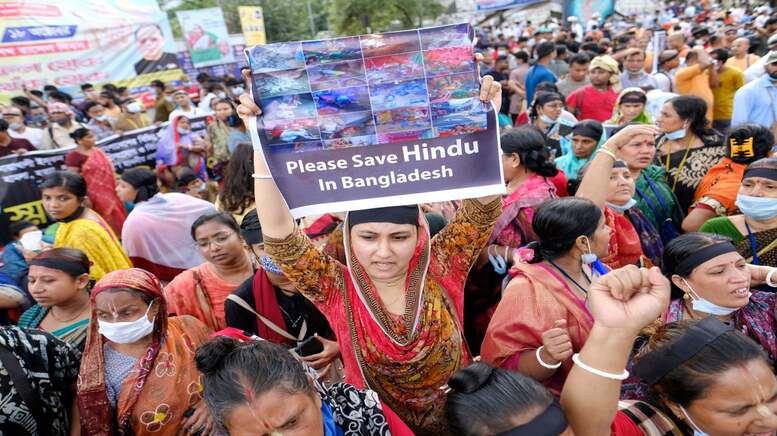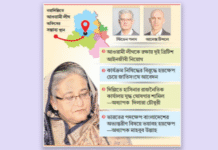
Despite the immense sacrifice made by the Hindu community in the liberation war, it could not reap any benefits of Bangladesh’s independence; even after 51 years of liberation, the Hindus continue to be one of the most subjugated denominations in the country. Soon after gaining independence with the help of Bharatiya forces, the Bangladesh government enforced the Enemy Property Act and seized 26 lakh acres of property belonging to the Hindus in the country. The financial loss due to the loss of land, ponds, and other movable property amounted to 20 lakh crore Takas.
Though the Islamic Republic claimed that it wanted to move away from Pakistan’s hate policies at the time of liberation, over the past 51 years, Bangladesh adopted the basic principles of Pakistan in their entirety. In these years of independence, the law of the land has become a hindrance to Hindus and people of other minority communities.
They have been forcibly evicted from their ancestral property. If one brother of a Hindu family left the country due to the torments of Pakistani forces and settled in Bharat, his other siblings who continued to stay in Bangladesh were forced to pay the atonement. Because in their books, if any Hindu who had a share in that combined owned property, then the whole property becomes “enemy property” that the government could usurp leaving the other Hindu family members robbed of their own property.
The simple idea on which the Bangladeshi authorities worked was that if a Hindu stays in the land of Muslims, he will be tormented until he leaves. After he fails to put up with these adversaries and leaves the country, his family members will be institutionally looted by the government. This process would continue till the last Hindu in Bangladesh didn’t leave that country.
The Ramna Kali Temple was bulldozed on May 13, 1983, just months after the Father of the Nation Bangabandhu Sheikh Mujibur Rahman was elected as the first Prime Minister of Bangladesh. The status of the Enemy Property Law continued to be just as pathetic for the minorities during the second and third parliamentary elections too, despite a power shift. The governments continued to deprive the religious minorities of fair and impartial access to property rights and civil liberties and never returned the properties it had grabbed from the Hindus.
After the fifth parliamentary elections held on February 28, 1991, the Hindus became the target of post-poll violence following the BNP-Jamaat victory. There were attacks, vandalism, looting and occupation, and rapes in different parts of the country, including but not limited to Raozan, Fatikchhari, Jessore, Comilla, Khulna, Noakhali, Chandpur, Hatia, and Dhaka.
But none of these cases reached the courts, and neither were any criminals punished. On the other hand, hundreds of Hindu youths were held in jail despite being found innocent in a false case of blasphemy. Land grabbing and vandalism of Hindu temples and murtis became the norm and daily occurrence. From April 5, 1991, to November 24, 1995, 163 Acts were passed in the Parliament’s 22 sessions. The Black Law concerning the “enemy property” was still not revised.
The seventh parliamentary elections were held on June 12, 1996; the Bangladesh Awami League, led by Sheikh Hasina won 146 out of 300 seats. Again, 191 laws were passed in 233 parliamentary sessions between 1996 to 2001. None was to relieve the minorities from their ongoing harassment.
In 2001, the Bangladesh Nationalist Party led by Begum Khaleda Zia came to power with 193 out of 300 seats in the Parliament. 165 laws were passed in her regime, but property rights, civil liberties, and forced emigration of the minorities were again brushed aside.
This barbaric practice of overlooking the plight of religious minorities continued through the ninth, tenth, and the ongoing 11th government. Many news laws were introduced, and acts were enacted. Notable among these were the sixteenth and seventeenth amendments to the Constitution. But the revolting law of “enemy / vested property” hasn’t been repealed. Zia and Hasina ignored the Hindus like they were invisible to both these leaders, year after year. Though Hasina enjoys a reputation of being minority-appeasing, her government has also not passed any law to protect minorities.
According to ‘Political Economy of Agriculture-Land-Waters Reform in Bangladesh’, a study by Dhaka University Professor Abul Barkat, 26 lakh acres of land that initially belonged to the Hindu community have been captured under the Enemy Property Act. A significant chunk of this land is agricultural land, 29 percent homestead, 4 percent is used for botany, 3 percent uncultivated, and 1 percent consists of ponds.
In his research, Dr. Barkat claims that around 230,612 Hindus go missing in the country or are forced to emigrate every year. In the final years of East Pakistan, when present-day Bangladesh was under Pakistan, around 705 Hindus went missing every day. In 1981, for a decade after the liberation, this number stayed at 512 people missing every day. From 1981 to 1991, the number reduced to an average of 438. From 1991 to 2001, around 6 Hindus were compelled to leave the country daily. The number of missing Hindus daily stayed at an average of 64 from 2001 to 2012, with 632 Hindus migrating out of the country every day.
If this trend continues, Bangladesh will be left with no more Hindus in two to three decades. But isn’t that the entire plan?









